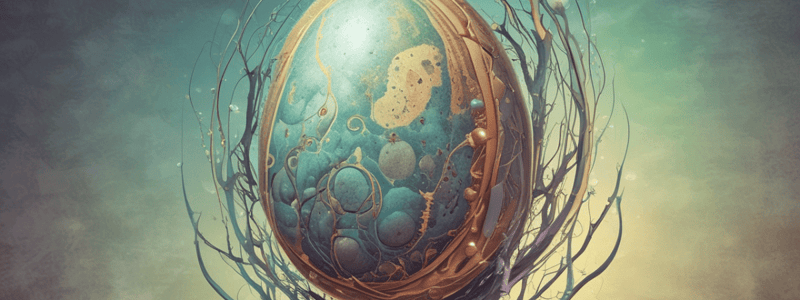Podcast
Questions and Answers
What is the primary function of the ovarian cycle?
What is the primary function of the ovarian cycle?
- It prepares the uterus for implantation.
- It initiates the menstrual cycle in males.
- It produces secondary oocytes for fertilization. (correct)
- It regulates hormone production in males.
What type of cell surrounds the primary oocyte in a follicle?
What type of cell surrounds the primary oocyte in a follicle?
- Granulosa cells (correct)
- Luteal cells
- Theca cells
- Cumulus oophorus cells
During which phase of the ovarian cycle does ovulation occur?
During which phase of the ovarian cycle does ovulation occur?
- Day 2
- Day 14 (correct)
- Day 21
- Day 28
At what point do primary oocytes complete meiosis one during the ovarian cycle?
At what point do primary oocytes complete meiosis one during the ovarian cycle?
What hormonal effect do granulosa cells have during the maturation of follicles?
What hormonal effect do granulosa cells have during the maturation of follicles?
Which of these describes the ovarian cycle's duration?
Which of these describes the ovarian cycle's duration?
What happens to the secondary oocyte after ovulation?
What happens to the secondary oocyte after ovulation?
What characterizes a primordial follicle?
What characterizes a primordial follicle?
What happens to hormone levels in the blood as granulosa cells increase in number?
What happens to hormone levels in the blood as granulosa cells increase in number?
What is the function of the zona pellucida?
What is the function of the zona pellucida?
How do granulosa cells nourish the primary oocyte?
How do granulosa cells nourish the primary oocyte?
What hormone do theca cells produce when stimulated by luteinizing hormone?
What hormone do theca cells produce when stimulated by luteinizing hormone?
What process do non-dominant follicles undergo during their development?
What process do non-dominant follicles undergo during their development?
What is the purpose of the antrum in the follical development?
What is the purpose of the antrum in the follical development?
At what meiotic stage are primary oocytes arrested?
At what meiotic stage are primary oocytes arrested?
What hormone do granulosa cells convert androstenedione into?
What hormone do granulosa cells convert androstenedione into?
During the ovarian cycle, how many eggs are typically ovulated?
During the ovarian cycle, how many eggs are typically ovulated?
How many eggs does a woman typically lose to atresia during each menstrual cycle?
How many eggs does a woman typically lose to atresia during each menstrual cycle?
What is the role of granulosa cells after receiving androstenedione from the theca cells?
What is the role of granulosa cells after receiving androstenedione from the theca cells?
What is the name of the mound of granulosa cells that protrudes into the middle of the antrum?
What is the name of the mound of granulosa cells that protrudes into the middle of the antrum?
What is the transformation that occurs to the follicle after the egg is released?
What is the transformation that occurs to the follicle after the egg is released?
What hormone does the corpus luteum produce that lowers the amount of FSH from the anterior pituitary?
What hormone does the corpus luteum produce that lowers the amount of FSH from the anterior pituitary?
What happens to the corpus luteum if the egg is fertilized?
What happens to the corpus luteum if the egg is fertilized?
On which day does the actual release of the egg occur?
On which day does the actual release of the egg occur?
What process do cells in the corpus luteum undergo if the egg is not fertilized?
What process do cells in the corpus luteum undergo if the egg is not fertilized?
What is the primary function of estrogen and progesterone produced by the corpus luteum?
What is the primary function of estrogen and progesterone produced by the corpus luteum?
What can occur when multiple follicles reach maturity during the menstrual cycle?
What can occur when multiple follicles reach maturity during the menstrual cycle?
What does the term 'atresia' refer to in the context of the menstrual cycle?
What does the term 'atresia' refer to in the context of the menstrual cycle?
Flashcards are hidden until you start studying
Study Notes
Ovarian Cycle Overview
- Ovarian cycle lasts approximately 28 days and is essential for maturation of eggs.
- Each cycle results in a secondary oocyte that can potentially be fertilized by sperm.
- The ovarian cycle plays a significant role in the menstrual cycle.
Follicle Development
- Primary oocytes develop within follicles, starting as primordial follicles.
- Follicles consist of a primary oocyte surrounded by granulosa cells.
- Granulosa cells increase in number and secrete hormones: estrogen, progesterone, and inhibin.
Timeline of the Ovarian Cycle
- Day 0: Initiation of primordial follicle development.
- Day 13: Growth of follicles leads to preparation for ovulation.
- Day 14: Ovulation occurs; the secondary oocyte is released.
- Days 15-28: Remaining follicles revert to primordial state.
Follicular Stages
- Primary follicles develop additional layers of granulosa cells and form zona pellucida, critical for oocyte nourishment.
- Pre-antral follicles have increased granulosa cell numbers.
- Theca cells surround the follicle and respond to luteinizing hormone (LH) by producing androstenedione, which granulosa cells convert to estrogen.
Antrum Formation
- Antrum is formed from fluid produced by granulosa cells, causing follicle expansion.
- Multiple follicles develop during the cycle, but usually, only one becomes the dominant follicle, with others undergoing atresia.
Atresia Process
- Atresia is the degeneration of non-dominant follicles, leading to the loss of 15-25 eggs per cycle.
- This results in a drastic reduction of available eggs from millions at birth to none around age 35.
Dominant Follicle Development
- The dominant follicle enlarges due to expanding antrum and forms a cumulus oophorus.
- Mature follicle leads to ovulation around day 14; follicle wall breaks to release the egg.
Post-Ovulation Changes
- Remaining follicle forms corpus luteum, secreting increased estrogen, progesterone, and inhibin.
- If fertilization occurs, the corpus luteum persists; if not, it degenerates within about 10 days.
Menstrual Cycle and Menopause
- Estrogen and progesterone prepare the endometrium for potential implantation.
- Menopause typically occurs between ages 50-51, marked by cessation of ovulation.
- Ovarian failure leads to reduced response to gonadotropins (LH and FSH), resulting in loss of menstrual cycles.
Additional Notes
- Pelvic pain may accompany ovulation in some women.
- Twin or multiple pregnancies may occur if multiple follicles are released during ovulation.
- Key hormones: Estrogen (promotes follicle growth and endometrial preparation), Progesterone (supports pregnancy), Inhibin (regulates FSH levels).
Studying That Suits You
Use AI to generate personalized quizzes and flashcards to suit your learning preferences.




